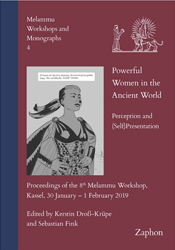(Self-)Presentation and Perception of Powerful Women in the Ancient World
Eighth Workshop of the Melammu Project
University of Kassel
30 Jenuary-1 February 2019
Organisers: Kerstin Droß-Krüpe & Sebastian Fink
Powerful Women in the Ancient World
Proceedings of the 8th Melammu Workshop
Edited by Kerstin Droß-Krüpe and Sebastian Fink
Melammu Workshops and Monographs 4
2021 / ISBN 978-3-96327-138-0 / 586 pages

Details and Contents
|
|
Workshop Program
|
Though we often consider the ancient world a male dominated and patrimonial world, our sources provide rich evidence for powerful, influential and even ruling women as well. Women in power are often perceived as an absolute Otherness, as oxymora and remarkable – and too often highly critically judged – exemptions or deviations, challenging the common order. This is particularly true for the portrayal of such women in classical sources – one may only think of Semiramis, Olympias, Cleopatra, Agrippina or Iulia Domna. But even in this source material exemptions occur, as Cornelia, mother of the Gracchi. But powerful women are by no means a ‘classical’ phenomenon – when it comes to the ancient Near East a remarkable number of similarly influential women appear, as for example Enheduanna or Adad-guppi. The workshop aims at combining papers on the portrayal of powerful ancient women in classical sources and cuneiform text, aiming at bringing together both a “western” and “eastern“ perspective on these exceptional women. The overall question would be if and how classical sources and cuneiform texts apply different narrative patterns when dealing with powerful women. In addition the workshop will focus on how the self-presentation of these women differs from their discursive/narrative treatment by (later, male) outsiders.
Key questions are e.g. what information we can get about their actual radius of action, their social and economic status and if it is possible to detect if these women were considered role models (and if so when and by whom) and what these details tell us about different gender roles in the Classical and Mesopotamian worlds.
The following documents are available:
- workshop program
|
|

